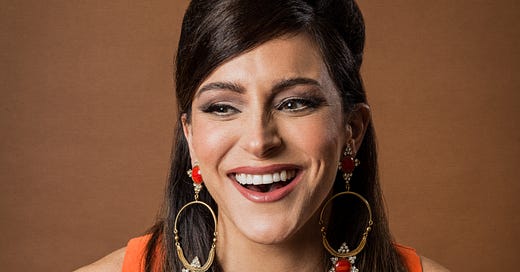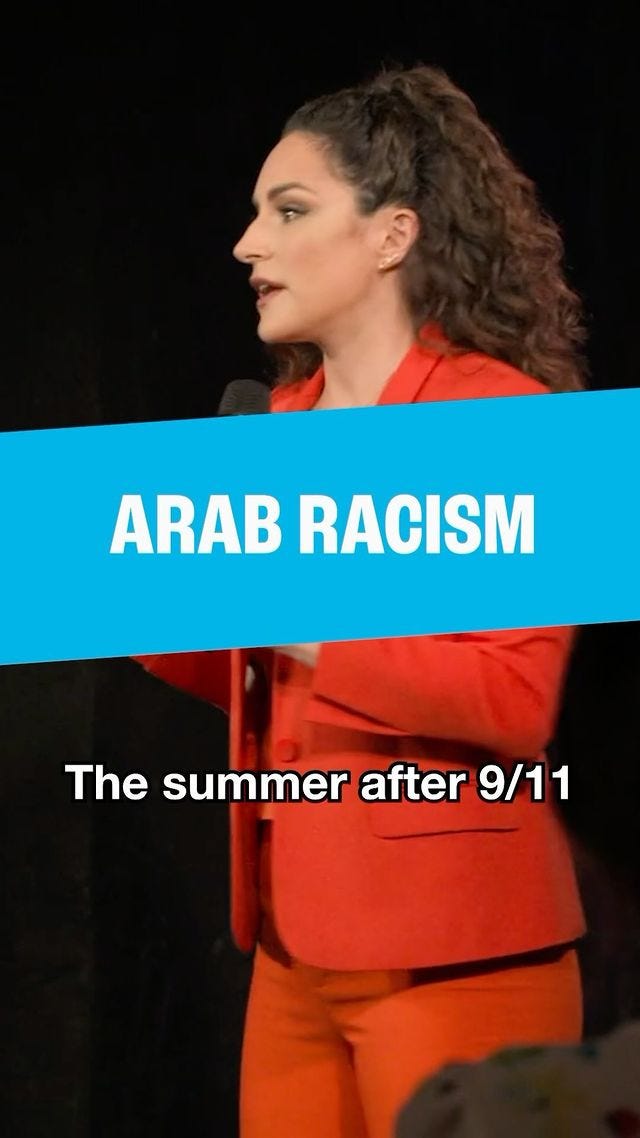Janine Harouni: “I don't like the idea of being a victim of your own life”
The comedian on expanding her worldview, her grandmother’s records and fitting in everywhere
Hi, welcome back to Mixed Messages! This week I’m speaking to comedian Janine Harouni, who is of mixed Lebanese, Irish and Italian heritage. In her new show, Man’oushe, Janine explores her Arab roots, especially in the context of family. Being Arab hasn’t always been easy to outwardly embrace, especially in post 9/11 New York, but Janine has a clear love for all the facets of her identity. Read her story below.
How have you described your identity?
I grew up in a very Italian neighbourhood in Staten Island and I looked like everyone else around me. People assumed I was Italian and I just always thought I was white with a little bit of something exotic.
Now that I'm older and living in the UK I definitely feel more non-white – there’s a different shade of white happening in this country. Now I’d probably say I’m half-Arab.
Has the way you’ve felt about your identity changed over time and space?
To give some context, I was 13 years old and living in New York when 9/11 happened. Because I was passing as Italian everywhere, I became a fly on the wall to very racist conversations. I remember one guy telling me that all Arabs should be put in detention centres – I don’t think he knew that my dad, who was his teacher, was 100% Lebanese.
It felt very empowering for me to tell him that he was talking about my dad, who he loved at high school. It helps to humanise this idea that all Arabs are terrorists, which was very prevalent in New York in the years after 9/11.
In a weird way, coming to the UK was a bit of a relief. At a seminal time in your life when you’re a teenager developing your sense of identity, I felt ashamed that my family were Arab.
Coming to London, there's a huge Muslim community which is amazing to see. Staten Island was very Catholic – it was exotic if you were Protestant. So the UK has been very welcoming, coming from a very heated moment in time for being an Arab American.
How did you experience your culture growing up?
My father’s mother was a classical Lebanese singer. I've been thinking a lot about my heritage from writing the show and becoming a mom, what family meant to her and the sacrifices she made as a woman.
There was always Arabic music on, like Fayrouz, a friend of my grandmother’s. She was also an amazing cook, there was always delicious Lebanese food. That was the strongest cultural touchstone in my family. More so than the Irish-Italian side of my mom, even though she makes a mean lasagne. She learned how to make Lebanese food when she married my dad and a lot of Lebanese members of my family think my mom is one of the best cooks
I cannot cook, but my full Irish husband cooks all the Lebanese food in the house. I’ll put my grandmother’s records on to keep her memory alive too.
Do you think being mixed has affected the way you see the world?
I know it makes people feel like they don’t belong in certain spaces and fall between two stools, not quite fitting here or there, but as a comedian and someone who writes about her own life, it’s important to see as many perspectives as you possibly can. I think that helps define your own perspective on what you think and believe.
I’m privy to all the conversations [Arabs] are having about their lives, their families and these effing British people. I’m also privy to what white people are talking about in white spaces, not knowing that I have a mixed background. It’s quite fun to be a fly on the wall in situations where I guess you wouldn’t if I very clearly looked one way or the other.
Have you ever felt in-between?
Definitely, because I don't speak the language I feel most out of place in Arab spaces. Not because I’m made to feel unwelcome, but because I feel one step removed.
I understand cultural references because I remember it with my grandmother, but the culture that I understand the most is blue collar New York, working class cops and firemen. I worked in a restaurant owned by the mob, I was surrounded by New York Italian culture.
Have you noticed any stereotypes around mixedness?
When people say that they feel like they don't fit in in either place, I kind of want to say ‘you can fit in anywhere.’ I don't like the idea of being a victim of your own life and circumstances, we can celebrate differences in a way that’s not disrespectful and doesn't make people feel like outsiders. I would love to push away from the narrative that you don't fit in anywhere. I would say you fit in everywhere, you know?
What’s the best thing about being mixed for you?
When someone says something they shouldn’t because they don’t realise they’re among mixed company, it’s very satisfying to then be like ‘actually I’m half-Arab.’ Beyond the pettiness, it's just nice to have other perspectives in your life. I feel really grateful that I got to go to Lebanon and meet my grandmother's family.
When you have a family that comes from a country and a culture that's so different from the one that you're living in, it really helps you to grow your own worldview and know that there are different lived experiences outside of your own, and that they're just as valid as yours. I hope that I can pass that on to my son – so often we only focus on the little world in front of us.
Can you sum up your mixed experience in one word?
Expansiveness. Instead of thinking that it puts you in a very small place, I'd like to think that it gives you more opportunity. I can connect with my grandmother who was born in Donegal and understand Irish culture as well as knowing so much about Arabness from my father’s family or Italian American culture from my mom.
Janine Harouni is currently on tour – get your tickets here! Next week, I’ll be speaking to author Noreen Masud, whose memoir, A Flat Place, has been shortlisted for the first Women’s Prize for Non-Fiction. Subscribe to get Mixed Messages in your inbox on Monday.
Enjoy Mixed Messages? Support me on Ko-Fi! Your donations, which can start from £3, help me pay for the transcription software needed to keep this newsletter weekly, as well as special treats for subscribers. I also earn a small amount of commission (at no extra cost to you) on any purchases made through my Bookshop.org and Amazon affiliate links, where you can shop books, music and more by mixed creators.
Mixed Messages is a weekly exploration of the mixed-race experience, from me, Isabella Silvers. My mom is Punjabi (by way of East Africa) and my dad is white British, but finding my place between these two cultures hasn’t always been easy. That’s why I started Mixed Messages, where each week I’ll speak to a prominent mixed voice to delve into what it really feels like to be mixed.







